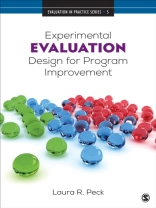The concepts of cause and effect are critical to the field of program evaluation. Experimentally-designed evaluations—those that randomize to treatment and control groups—offer a convincing means for establishing a causal connection between a program and its effects.
Experimental Evaluation Design for Program Improvement considers a range of impact evaluation questions, particularly those questions that focus on the impact of specific aspects of a program. Laura R. Peck shows how a variety of experimental evaluation design options can provide answers to these questions, and she suggests opportunities for experiments to be applied in more varied settings and focused on program improvement efforts.
Содержание
List of Boxes, Figures, and Tables
Volume Editors’ Introduction
About the Author
Acknowledgments
Chapter 1 • Introduction
The State of the Field
The Ethics of Experimentation
What This Book Covers
Questions and Exercises
Resources for Additional Learning
Chapter 2 • Conceptual Framework: From Program Logic Model to Evaluation Logic Model
Program Logic Model
Evaluation Logic Model
Conclusion
Questions and Exercises
Resources for Additional Learning
Chapter 3 • The Basic Experimental Design Defined
Random Assignment Explained
The Basic (Two-Armed) Experimental Design
To Have a Control Group or Not to Have A Control Group?
Questions and Exercises
Resources for Additional Learning
Chapter 4 • Variants of the Experimental Design
Multi-Armed Designs
Factorial Designs
Multistage Designs
Staggered Introduction Designs
Blended Designs
Aligning Evaluation Design Options With Program Characteristics and Research Questions
Conclusion
Questions and Exercises
Chapter 5 • Practical Considerations and Conclusion
Some Practical Considerations
Road Testing
Principles for Conducting High-Quality Evaluation
Questions and Exercises
Resources for Additional Learning
Appendix • Doing the Math and Other Technical Considerations
Estimating Treatment Impacts
How to Interpret Results
Handling Treatment Group No-Shows and Control Group Crossovers
Subgroup Analyses
Conclusion
Questions and Exercises
Resources for Additional Learning
References
Glossary
Index
Об авторе
Laura R. Peck, Ph.D., is a principal scientist at Abt Associates and has spent her career evaluating social welfare and employment policies and programs, both in research and academic settings. A policy analyst by training, Dr. Peck specializes in innovative ways to estimate program impacts in experimental and quasi-experimental evaluations, and she applies this to many social safety net programs. Dr. Peck is currently the principal investigator, co-PI, or director of analysis for several major national evaluations for the U.S. Departments of Health and Human Services, Labor, and Housing and Urban Development and over her career has been part of more than 35 informative evaluations of nonprofit, local, state, and federal programs and policies. Peck is a co-author of a public policy textbook and is well published on program evaluation topics. Prior to her work at Abt Associates, Dr. Peck was a tenured professor at the Arizona State University School of Public Affairs and also served as the founding associate dean of the Barrett Honors College, Downtown Phoenix campus. She earned her Ph D from the Wagner Graduate School at New York University.












